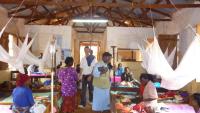MalariaCare

Ghana, Nigeria, Mali, Liberia, Ethiopia, DRC, Kenya, Tanzania, Malawi, Madagascar, Mozambique, Zambia, Burma, Cambodia
PROGRAM FACULTY: jamie eliades
Malaria, and other febrile causes of illness, contribute to a significant proportion of morbidity and mortality in sub-Saharan Africa and to a lesser degree in South-East Asia, where resistance to the primary anti-malaria drugs has developed. In addition to decreased transmission through vector control methods such as the use of long-lasting insecticide treated bed nets, accurate diagnosis and treatment of these conditions is essential in averting death and disability. There are multiple barriers to the provision of quality case management services including human resource limitations, access issues, poor laboratory services, and a culture that for decades has equated fever to malaria, diagnosed solely on clinical grounds. This project, led by PATH, aims to work with Ministries of Health to improve the quality of diagnosis and treatment, case management, of malaria and other febrile illnesses. It works to build quality assurance systems with linked activities to achieve this goal that include training, supportive supervision, and data collection, analysis and use for decision making and targeting interventions. While large amounts of donor funding are spent on training and supportive supervision, the latter a strategy promoted by WHO, there is a paucity of data demonstrating it's effectiveness and which factors are most important to it's success. MalariaCare is analyzing data from across all it's countries to identify factors that are most associated with improvement in health care worker performance in improving the provision of quality case management. These include core competencies such as recognizing the need for a diagnostic test, accurately performing that test, adhering to the results and providing proper treatment.